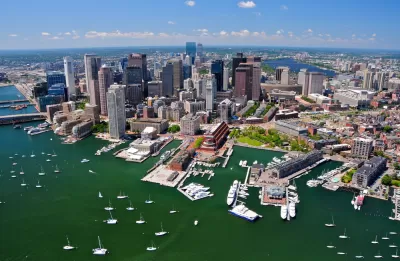The big news about GE moving to Boston is more than just a story about a large company moving from the suburbs to the big city—it's also about how far cities will go to attract new jobs, and at what cost.

"GE got a pretty good deal on their new, Boston home," writes Evan Horowitz.
Although Horowitz mentions Boston's charms—both of location and population—the point here is offer critical analysis of the massive tax breaks the company received to change locations. The details of the deal to bring the company to Boston include, according to Horowitz, "up to $25 million in property tax breaks, as much as $120 million for infrastructure to support the creation of a new corporate campus, and perhaps another $125 million to upgrade nearby roads and bridges."
The article then explains, point-by-point, the policy debate over the effectiveness of luring businesses between states with such lucrative incentives. One of the article's clear messages is not to overplay the importance of this deal to bring 800 employees to a Massachusetts economy that created 6,000 jobs a month in 2015:
Good or bad, though, it’s important to recognize that the GE deal is teeny, a small move in the broader game of economic development. GE’s arrival isn’t to going transform Massachusetts, and the tax incentives will barely make a ripple in the nearly $40 billion state budget.
FULL STORY: Are incentives like those for GE effective in building an economy?

Trump Administration Could Effectively End Housing Voucher Program
Federal officials are eyeing major cuts to the Section 8 program that helps millions of low-income households pay rent.

Planetizen Federal Action Tracker
A weekly monitor of how Trump’s orders and actions are impacting planners and planning in America.

Ken Jennings Launches Transit Web Series
The Jeopardy champ wants you to ride public transit.

California Invests Additional $5M in Electric School Buses
The state wants to electrify all of its school bus fleets by 2035.

Austin Launches $2M Homelessness Prevention Fund
A new grant program from the city’s Homeless Strategy Office will fund rental assistance and supportive services.

Alabama School Forestry Initiative Brings Trees to Schoolyards
Trees can improve physical and mental health for students and commnity members.
Urban Design for Planners 1: Software Tools
This six-course series explores essential urban design concepts using open source software and equips planners with the tools they need to participate fully in the urban design process.
Planning for Universal Design
Learn the tools for implementing Universal Design in planning regulations.
Ada County Highway District
Clanton & Associates, Inc.
Jessamine County Fiscal Court
Institute for Housing and Urban Development Studies (IHS)
City of Grandview
Harvard GSD Executive Education
Toledo-Lucas County Plan Commissions
Salt Lake City
NYU Wagner Graduate School of Public Service




























